Home Remedies For Chest Pain: 11 Effective Natural Remedies
Be aware of the causes and symptoms to get safe and effective relief at home.

Image: Midjourney/ StyleCraze Design Team

Home remedies for chest pain are beneficial if the ache in your chest has resulted from strenuous activity or indigestion. Depending on the source of your chest pain, you may be able to tackle it at home.
You may get anxious whenever you feel a sharp, intense, burning sensation in your chest and think you are experiencing a heart attack, but it isn’t always the case. Although cardiac arrest is a possibility, especially if you have pain in your left side, chest pain can have multiple reasons.
According to a study in AHA Journals, chest pain accounts for more than 6.5 million visits or 4.7% of all emergency department visits, making it the second most frequent reason for adult emergency department (ED) visits in the US, after injuries. Coronary artery disease (CAD) affects more than 18.2 million adults in USA and remains the leading cause of death for women and women, accounting for more than 365 000 deaths annually.
Here we discuss some potential causes of chest pain as well as simple home or natural remedies that can help alleviate it. To learn more, continue reading.
In This Article
What Causes Chest Pain?
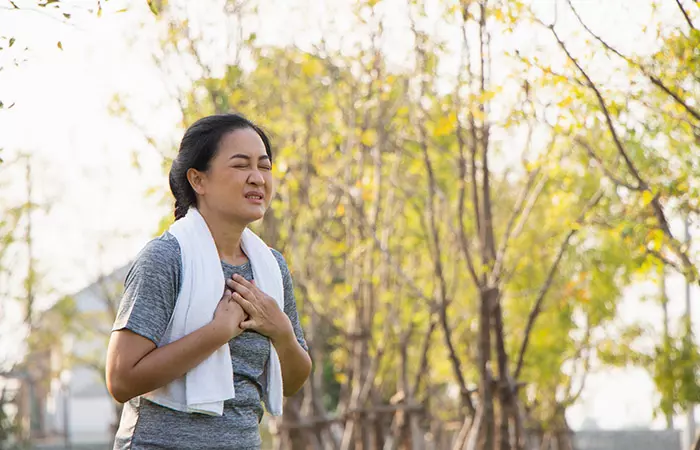
Chest pain differs from person to person and varies in its intensity, location, and duration.
And though it is one of the major symptoms of a heart condition, it could also occur due to less serious issues. Dr. Peter Michael, MD, says, “It can be difficult to tell the difference between chest pain caused by heart or muscle. Signs that chest pain is caused by the heart include pain that spreads to the arms, neck, jaw, or back; pain that is accompanied by shortness of breath, sweating, nausea, or dizziness and pain that is relieved by rest or nitro. Muscle pain can be tender to touch alleviated through massage, position, and or anti-inflammatories.” Let us look at the causes of chest pain.
Heart-related Causes
- Heart attack
- Angina due to blocked blood vessels of your heart
- Pericarditisi A condition causing inflammation and irritation of the fluid-filled saclike connective tissue layer surrounding the heart. , which is caused by inflammation of a sac around your heart
- Myocarditis, which is caused by inflammation of the heart muscle
- Cardiomyopathy, a disease of the heart muscle
- Aortic dissection, which is caused by a tear in the aorta
Lung-related Causes
- Bronchitisi An infection leading to swelling and mucus accumulation in the bronchi channels that direct the air from the windpipe to the lungs.
- Pneumonia
- Pleuritis
- Pneumothorax, which is caused by leakage of air from your lungs into your chest
- Pulmonary embolism or blood clot
- Bronchospasm or constriction of your air passages (common in those with asthma)
Muscle Or Bone- related Causes
- Injured or broken ribs
- Sore muscles from exertion or pain syndromes
- Pressure on your nerves because of compression fractures
Other Causes
- Medical conditions like shinglesi A viral infection caused by the reactivation of the chicken pox virus, characterized by an itchy skin rash and high fever.
- Pain attacks that result in intense fear
Dr. Michael adds, “Gas can cause chest pain, usually in the form of heartburn or indigestion.”
 Quick Tip
Quick TipIn addition to a pain in your chest, you may also experience other symptoms that are listed below.
Key Takeaways
- A few causes of chest pain are bronchitis, angina, sore muscles, or shingles.
- Drinking aloe vera juice daily may improve heart health and reduce the risk of chest pain.
- The magnesium in basil improves blood flow and relaxes the blood vessel, decreasing chest pain.
- Avoid strenuous activities and work on stress management to reduce chest pain.
Signs And Symptoms Of Chest Pain
Heart-related Symptoms
- Chest feels tight and pressured
- Jaw, back or arm pain
- Fatigue and weakness
- Dizziness
- Abdominal aches
- Pain during exertion
- Shortness of breath
- Nausea
Other Symptoms
- An acidic/sour taste in the mouth
- Pain on swallowing or eating
- Difficulty in swallowing
- Pain that worsens or feels better depending on your body position
- Pain on breathing deeply or coughing
- Fever and chills
- Panic or anxiety
- Back pain that radiates toward the chest
According to Dr. Michael, “Your chest pain may be serious if it is accompanied by shortness of breath, nausea, sweating, dizziness, palpitations (irregular heartbeats), or pain that radiates down your arm or jaw. He adds, “If the chest pain has occurred in the past that is an automatic indicator.” Therefore, consult a doctor immediately if you experience any of these associated symptoms.
Chest pain doesn’t just hurt; it could also interfere with your day-to-day affairs and throw your life out of gear. Hence, it is best to treat it as soon as possible. Below, we have listed 11 best ways to treat chest pain.
11 Best Home Remedies To Treat Chest Pain
- Garlic
- Aloe Vera Juice
- Vitamins
- Apple Cider Vinegar
- Hot Drinks
- Turmeric With Milk
- Basil
- Cayenne Pepper
- Fenugreek Seeds
- Almonds
- Pomegranate Juice
How To Cure Chest Pain Naturally
If you are experiencing discomfort and are wondering how to get rid of chest pain, here’s what you need to do:
1. Garlic
You Will Need
- 1 teaspoon of garlic juice
- 1 cup of warm water
What You Have To Do
- Add a teaspoon of garlic juice to a cup of warm water.
- Mix well and consume it every day.
- You can also chew on one or two garlic cloves every morning.
How Often You Should Do This
Do this 1 to 2 times daily.
Why This Works
Among the various benefits of garlic, the major ones are preventing cardiovascular disease and improving blood flow to your heart (1), (2). Poor blood flow to your heart increases the risk of cardiovascular disease, and this, in turn, increases the chances of developing chest pain. Hence, daily consumption of garlic is a great way to deal with chest pain.
2. Aloe Vera Juice
You Will Need
1/4 cup of aloe vera juice
What You Have To Do
Consume aloe vera juice.
How Often You Should Do This
You must drink aloe vera juice 1 to 2 times daily.
Why This Works
Aloe vera is a miraculous plant that offers a wide range of health benefits.
It can help strengthen your cardiovascular system, regulate good cholesterol, lower your triglyceride levels, and also reduce blood pressure (3), (4). All of these help in relieving chest pain.
 Trivia
Trivia3. Vitamins
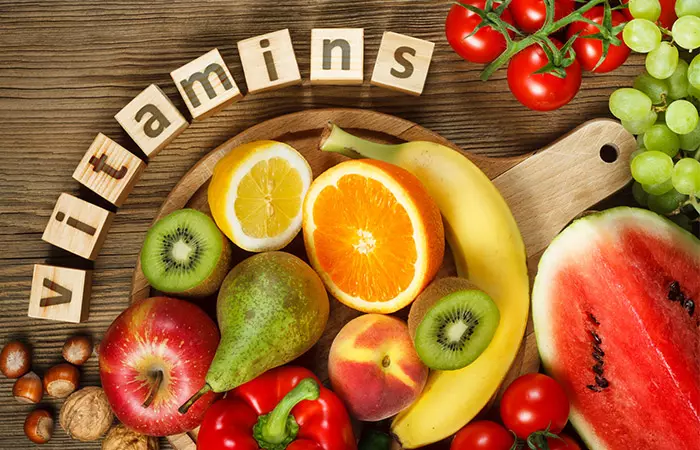
Studies have found that deficiencies in vitamins D and B12 lead to chest pain and even myocardial infarction or heart attack (5), (6). So, if you are suffering from chest pain, one of the first things you must address is your diet. Ensure that you are following a balanced and healthy diet that contains foods rich in all the vitamins required for your body to function normally.
Consume foods like fish, cheese, egg yolk, cereals, soy products, and meat. You may also opt for additional supplements of these vitamins after consulting your doctor.
4. Apple Cider Vinegar
You Will Need
- 1 tablespoon of apple cider vinegar
- 1 glass of water
What You Have To Do
- Add a tablespoon of apple cider vinegar to a glass of water and mix well.
- Consume this solution.
How Often You Should Do This
You must drink this solution preferably before meals or whenever you experience chest pain.
Why This Works
Apple cider vinegar, with its powerful anti-inflammatory properties, helps treat heartburn and acid reflux, which are the common culprits behind chest pain (7).
Steve, a YouTuber shared his experience of drinking apple cider vinegar for acid reflux and how it helped. He said that he has been on medications for reflux for 10 years and had decided to try an alternative for it. He stated, “I am here to tell you no ill-effects at all, no reflux, nothing so I am starting to think this apple cider vinegar is doing the trick (i).”
5. Hot Drinks
Sipping on anything hot – be it a glass of hot water or a refreshing cup of herbal tea – can help relieve chest pain that occurs due to bloating or indigestion. Hot drinks can reduce bloating, aid digestion, and enhance heart health. However, there is limited scientific evidence demonstrating their effectiveness in treating chest pain.
6. Turmeric With Milk.
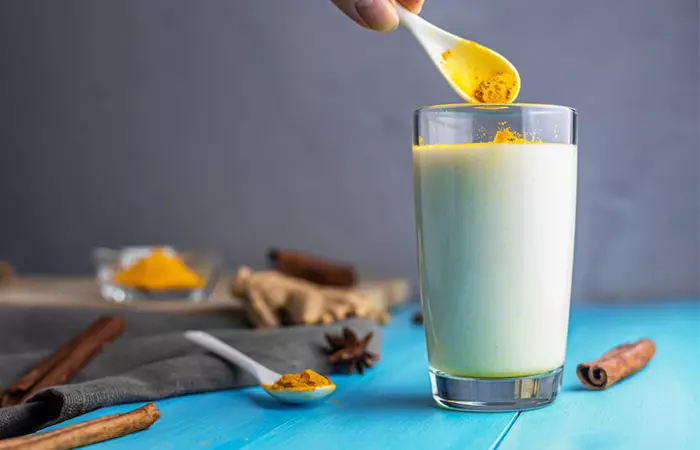
You Will Need
- 1/2 teaspoon of turmeric powder
- 1 glass of hot milk
What You Have To Do
- Mix half a teaspoon of turmeric powder in a glass of hot milk.
- Consume this mixture.
How Often You Should Do This
You must drink this mixture once daily, before going to bed.
Why This Works
Turmeric is a rich source of curcumin. This compound is widely used to reduce cholesterol oxidation, clot formation, and artery plaque build-up – all of which may lead to heart problems and chest pain (8), (9). Curcumin also possesses anti-inflammatory properties that help in reducing the intensity of chest pain (10).
7. Basil
You Will Need
8-10 basil leaves
What You Have To Do
- Chew on basil leaves.
- Alternatively, you can consume basil tea.
- You can also extract a teaspoon of basil juice and consume it with some honey.
How Often You Should Do This
Do this once daily for effective results.
Why This Works
Basil contains high levels of vitamin K and magnesium. While magnesium promotes blood flow to the heart and relaxes the blood vessels, vitamin K prevents the build-up of cholesterol in the walls of your blood vessels (11), (12). This helps in the treatment of cardiac disorders as well as chest pain (13).
8. Cayenne Pepper
You Will Need
- 1 teaspoon of powdered cayenne pepper
- 1 glass of any fruit juice
What You Have To Do
- Add one teaspoon of cayenne pepper to a glass of any fruit juice and mix well.
- Consume this.
How Often You Should Do This
You must consume this once daily.
Why This Works
Cayenne pepper contains capsaicin, which possesses strong anti-inflammatory properties that help lessen the intensity of pain in your chest (14). It also helps in regulating the blood flow to your heart, thereby preventing heart diseases that may also lead to chest pain (15).
9. Fenugreek Seeds
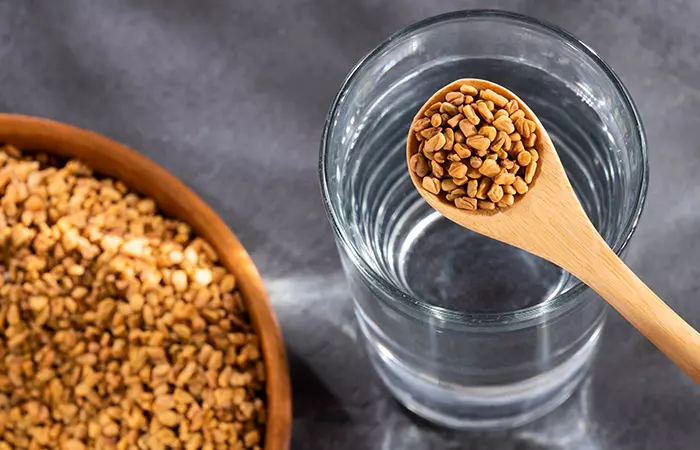
You Will Need
1 teaspoon of fenugreek seeds
What You Have To Do
- Soak a teaspoon of fenugreek seeds overnight and consume them the next morning.
- Alternatively, you can boil a teaspoon of fenugreek seeds in some water for 5 minutes and drink the mixture after straining.
How Often You Should Do This
Do this 1 to 2 times daily.
Why This Works
Fenugreek seeds
exhibit powerful anti-inflammatory and antioxidant properties that enhance cardiovascular health and prevent chest pain (16). They do so by promoting blood flow to the heart and reducing the cholesterol levels (17).
10. Almonds
You Will Need
A handful of almonds
What You Have To Do
- Soak a handful of almonds in water for a couple of hours.
- Remove the skin and eat the almonds.
- You can also mix equal amounts of almond oil and rose oil and rub the mixture on your chest for quick relief.
How Often You Should Do This
You must do this once daily.
Why This Works
Almonds are rich sources of polyunsaturated fatty acids, which not only promote cardiac health but also help reduce cholesterol levels (18 ), (19). This can help in the treatment of cardiovascular disease and chest pain.
11. Pomegranate Juice
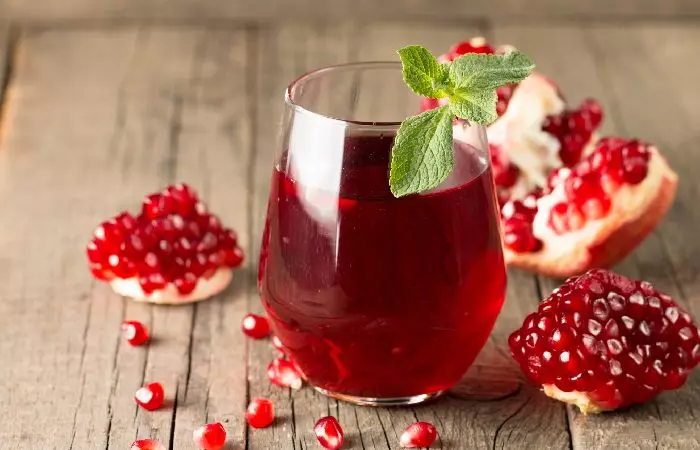
You Will Need
1/2 to 1 cup of fresh pomegranate juice
What You Have To Do
Consume the pomegranate juice. You can dilute it with water for the desired consistency.
How Often You Should Do This
Once a day or whenever you experience chest pain
Why This Works
Pomegranate juice is rich in antioxidants that may help relax blood vessels, reduce inflammation, and improve blood flow. This may help reduce chest pain and prevent cardiovascular issues (20), (21), ( 22). A study published in Phytotherapy Research Journal found that patients with ischemic heart disease who consumed pomegranate juice showed significant reductions in chest pain (23).
In addition to these remedies, you can also try the following:
a. Cold Compress or Pack: Strenuous activities like exercises or blunt trauma can cause chest pain. The application of cold packs can help to get rid of swelling and pain. Hot compress also works to alleviate pain.
b. Lie Down: Lying down immediately with the head elevated above the body relieves chest pain due to angina as gravity is eliminated and blood supply to heart is increased. Sitting upright can relieve pain due to acid reflux.
c. Alkaline Foods: Alkaline foods can reduce inflammation in the body, thereby reducing the incidence of peptic ulcer, heart diseases, and cancer. A few alkaline foods are fruits like apple, banana, blackberries, dates, oranges, and pineapple, and vegetables like broccoli, cabbage, mushroom, carrot, celery, mushrooms, pumpkin, and eggplants.
Once you have given the above remedies a shot, you can also follow these tips for relief.
Relief Tips

- Avoid strenuous activities.
- Follow a balanced diet.
- Limit the intake of alcohol.
- Avoid using tobacco.
- Keep yourself stress-free.
- Practice certain yoga poses to relieve chest pain, these include Matsyasana (Fish Pose), Bhujangasana (Cobra Pose), and Dhanurasana (Bow Pose).
- Try acupressure massages.
- Practice meditation, breathing exercises, and relaxation techniques.
Note:
The home remedies and relief tips mentioned above are meant to complement and not replace professional medical advice. So, before trying them, consider any underlying health condition and check with a healthcare professional. Chest pain is a serious concern and may even require immediate medical attention. Scroll down to find out when you should consider visiting your doctor.
When To Seek Medical Attention
If your chest pain worsens even after following the remedies mentioned above, it is best to contact a doctor. In some cases, it is recommended to seek emergency care and not waste time on any self-treatments. These include a sudden and intense chest pain accompanied by the following symptoms:
- Jaw pain
- Neck pain
- Back pain
- Arm or shoulder pain
- Difficulty breathing
- Shortness of breath
- Stomach pain
- Nausea
- Vomiting
- Dizziness
- Fainting
Infographic: 4 Easy Home Remedies For Relieving Chest Pain
Chest pain can be caused by a variety of factors. While some causes are minor, others could be grave and perhaps fatal. However, if your chest pain is caused by indigestion or strenuous physical exercise, you can try out the four best home remedies listed in the infographic below. Check them out!
Some thing wrong with infographic shortcode. please verify shortcode syntax
Chest pain can arise due to numerous reasons like issues related to the heart, lungs, musculoskeletal system, panic disorders, and even indigestion. Associated symptoms with chest pain can help you get an idea of what might be causing your chest pain and take action accordingly. The home remedies for chest pain discussed in this article are effective if your chest pain is related to indigestion or intensive physical activity. Other than these remedies, lemon and ginger also help provide chest pain relief. For immediate pain relief, taking an aspirin may also help. However, persistent chest pain that does not get resolved after using the remedies requires immediate medical attention as it may be a sign of a serious underlying condition.
Frequently Asked Questions
Why does my chest pain while swallowing food?
You may experience chest pain and feel nauseous while swallowing food if you are suffering from esophagitis, an inflammation of your esophagus lining.
What are the causes of chest pain in young adults?
Some of the common causes of chest pain in young adults are overexertion, cold, cough, pleurisyi Inflammation of the sheet-like layers that cover the lungs (the pleura) and is usually caused by viral or bacterial infections. , pericarditis, and hypertrophic cardiomyopathyi A condition that causes the cardiac muscles to thicken, leading to incapacitated heart function and obstruction in blood flow. .
Can chest pain occur during early pregnancy?
Yes. Changes in your body, stress, heartburn, and indigestion are some of the most common causes of chest pain during pregnancy.
Can chest pain occur due to cold weather?
Yes. Although the exact cause of this is yet to be found, it could be due to the swelling of the cartilage called joint space
Why does the right side of my chest hurt?
A pain in the right side of your chest could be an indication of an inflamed or irritated lung or chest lining, also referred to as pleuritis. You may experience a sharp pain when you try to cough, sneeze, or even breathe when you are suffering from pleuritis. Trauma to the chest, heartburn, muscle strain, or medical conditions like costochondritisi Inflammation of the costal cartilage linking the sternum to the ribs that causes sharp pain in the upper chest. , pancreatitisi Pancreatic inflammation marked by abdominal pain and is usually caused by excessive alcohol consumption or gallbladder stones. , and shingles can also cause pain in the right side of your chest.
What is the first aid for chest pain?
Call an ambulance, calm the person down, and support them in getting some rest. Assist them in taking their nitrate prescription or offer them 250 mg of an acetylsalicylic acid-containing medication to chew on. If they are unresponsive, start CPR for 100 to 120 compressions a minute.
How long does chest pain last?
It varies depending on the cause and the individual. It may last anywhere from a couple of minutes to hours. Chronic chest pain may last up to 6 months or longer. Consult your doctor in such cases.
How do you sleep with chest pain?
It is recommended to sleep at an incline on your left side if you are experiencing chest pain.
Can dehydration cause chest pain?
Possibly. Severe dehydration may cause shortness of breath and dizziness accompanied by chest pain.
Can too much water cause chest pain?
Possibly. Excessive hydration may hinder the potassium levels of your body. Once the levels decline, you may experience chest pain.
Illustration: Effective Home Remedies To Get Rid Of Chest Pain + Relief Tips
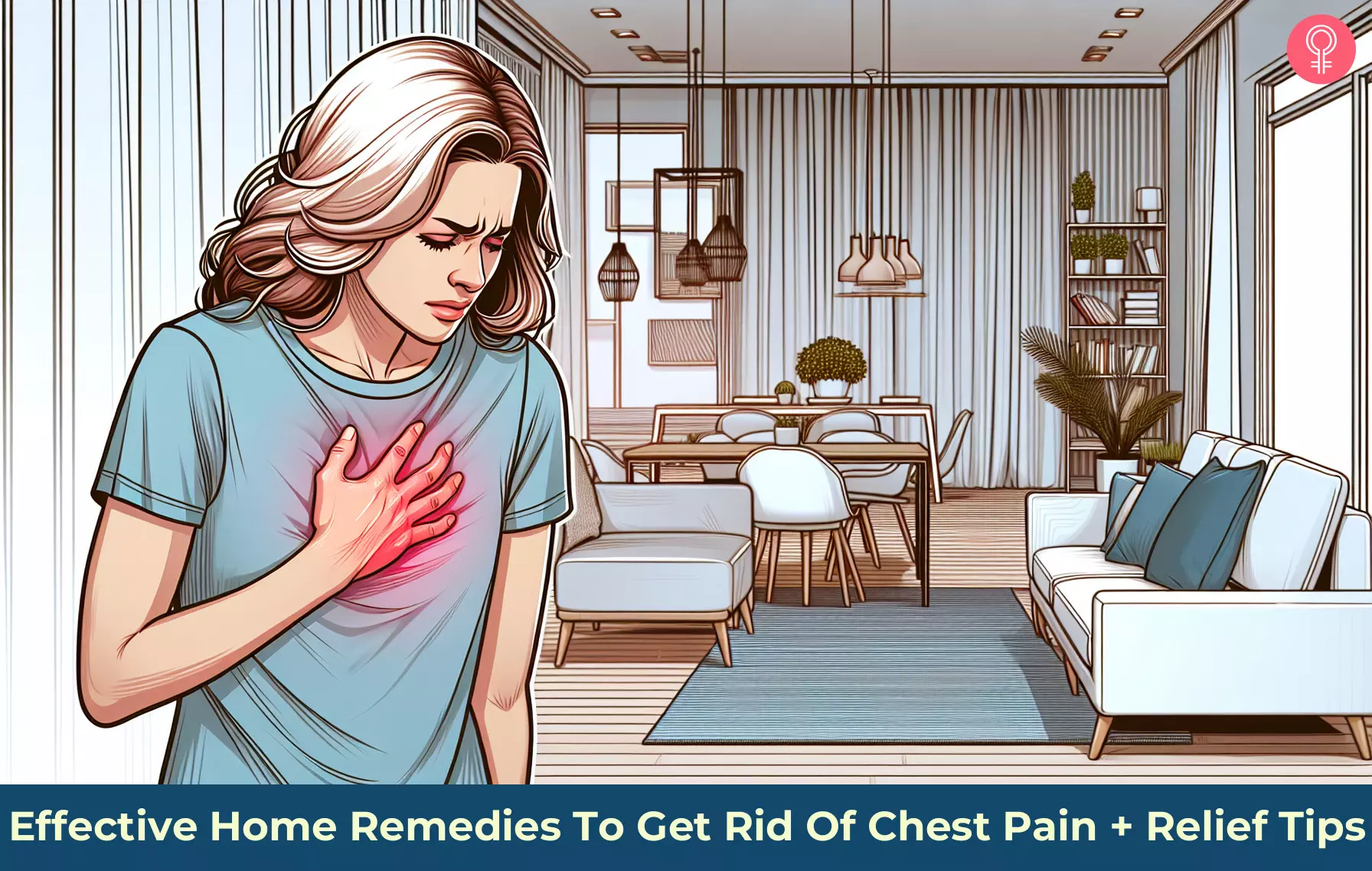
Image: Dall·E/StyleCraze Design Team
Learn seven simple ways to relieve chest pains. Get tips on how to ease your discomfort quickly and naturally by checking out the video below.
Personal Experience: Source
StyleCraze's articles are interwoven with authentic personal narratives that provide depth and resonance to our content. Below are the sources of the personal accounts referenced in this article.
i. 30 Days of Apple Cider Vinegar vs 15 years of GERD/Refluxhttps://www.youtube.com/watch?v=JkJu9OAJ8l4
References
Articles on StyleCraze are backed by verified information from peer-reviewed and academic research papers, reputed organizations, research institutions, and medical associations to ensure accuracy and relevance. Read our editorial policy to learn more.
- Effect of garlic on cardiovascular disorders: a review
https://www.ncbi.nlm.nih.gov/pmc/articles/PMC139960/ - Potential of garlic (Allium sativum) in lowering high blood pressure: mechanisms of action and clinical relevance
https://www.ncbi.nlm.nih.gov/pmc/articles/PMC4266250/ - Prevention of Atheromatous Heart Disease
https://journals.sagepub.com/doi/abs/10.1177/000331978503600801 - The effect of Aloe vera leaf gel on fatty streak formation in hypercholesterolemic rabbits
https://www.ncbi.nlm.nih.gov/pmc/articles/PMC3634268/ - Chest Pain and Costochondritis Associated with Vitamin D Deficiency: A Report of Two Cases
https://www.hindawi.com/journals/crim/2012/375730/ - Acute Myocardial Infarction in a Young Lady due to Vitamin B12 Deficiency Induced Hyperhomocysteinemia
https://www.ncbi.nlm.nih.gov/pmc/articles/PMC4379639/ - 7. Effectiveness of Nutritional Ingredients on Upper Gastrointestinal Conditions and Symptoms: A Narrative Review
https://www.ncbi.nlm.nih.gov/pmc/articles/PMC8839470/ - The effect of curcumin on lipid level in patients with acute coronary syndrome
https://pubmed.ncbi.nlm.nih.gov/19151449/ - Efficacy and safety of turmeric and curcumin in lowering blood lipid levels in patients with cardiovascular risk factors: a meta-analysis of randomized controlled trials
https://pubmed.ncbi.nlm.nih.gov/29020971/ - Anti-inflammatory properties of curcumin, a major constituent of Curcuma longa: a review of preclinical and clinical research
https://pubmed.ncbi.nlm.nih.gov/19594223/ - Role of magnesium in cardiovascular diseases
https://pubmed.ncbi.nlm.nih.gov/24896250/ - Vitamin K for the primary prevention of cardiovascular disease
https://pubmed.ncbi.nlm.nih.gov/26389791/ - Antihypertensive effects of Ocimum basilicum L. (OBL) on blood pressure in renovascular hypertensive rats
https://pubmed.ncbi.nlm.nih.gov/20448636/ - Capsaicin exhibits anti-inflammatory property by inhibiting IkB-a degradation in LPS-stimulated peritoneal macrophages
https://pubmed.ncbi.nlm.nih.gov/12531428/ - Blood Circulation Stimulation Properties of Cayenne Pepper:A Review
https://www.researchgate.net/publication/326060740 - Anti-inflammatory activity of fenugreek (Trigonella foenum-graecum Linn) seed petroleum ether extract
https://www.ncbi.nlm.nih.gov/pmc/articles/PMC4980935/ - Effect of fenugreek consumption on serum lipid profile: A systematic review and meta-analysis
https://pubmed.ncbi.nlm.nih.gov/32385866/ - Dose response of almonds on coronary heart disease risk factors: blood lipids, oxidized low-density lipoproteins, lipoprotein(a), homocysteine, and pulmonary nitric oxide: a randomized, controlled, crossover trial
https://pubmed.ncbi.nlm.nih.gov/12221048/ - Almonds and Cardiovascular Health: A Review
https://www.ncbi.nlm.nih.gov/pmc/articles/PMC5946253/ - Natural pomegranate juice reduces inflammation, muscle damage and increase platelets blood levels in active healthy Tunisian aged menFootnoteFootnote
https://www.tandfonline.com/doi/full/10.1016/j.ajme.2017.03.005 - Could Pomegranate Juice Help in the Control of Inflammatory Diseases?
https://www.mdpi.com/2072-6643/9/9/958 - The Effect of Pomegranate Juice and Sumac Consumption in the Treatment of Outpatients with COVID-19
https://www.ncbi.nlm.nih.gov/pmc/articles/PMC9729036/ - Cardioprotective Effects of Pomegranate (Punica granatum) Juice in Patients with Ischemic Heart Disease
https://pubmed.ncbi.nlm.nih.gov/28913846/
Read full bio of Dr. Bhakti Kapse
Read full bio of Shaheen Naser
Read full bio of Arshiya Syeda
Read full bio of Dipti Sharma






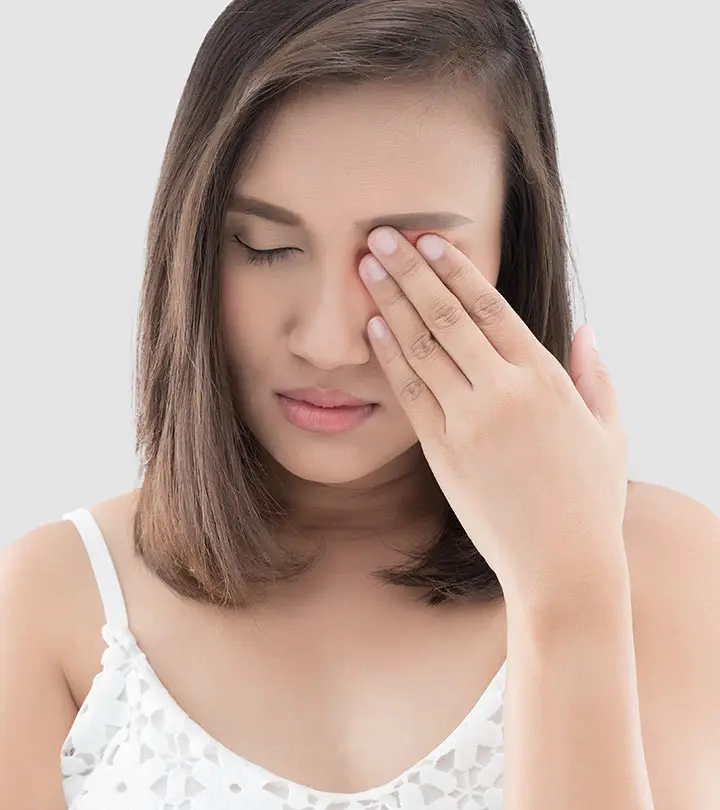
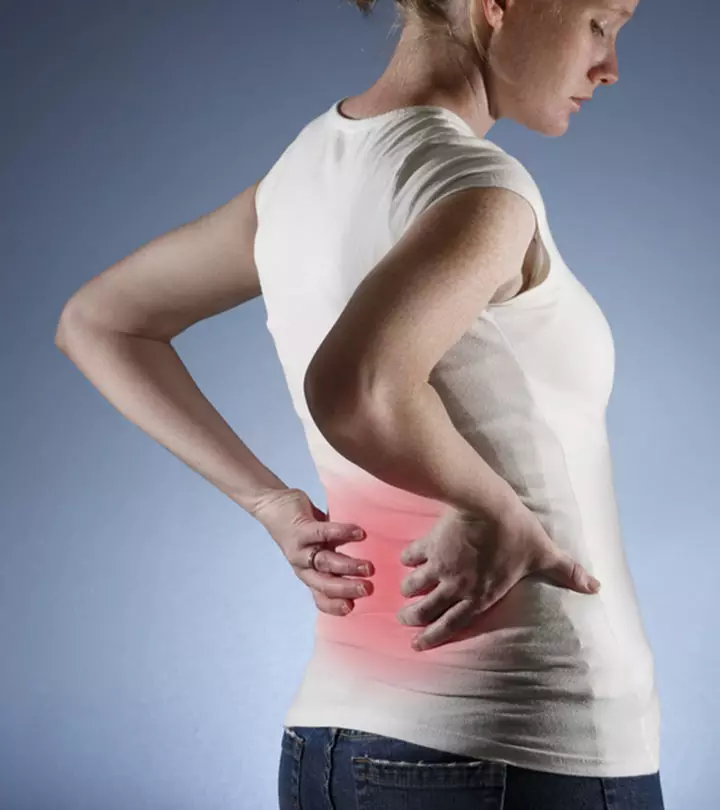
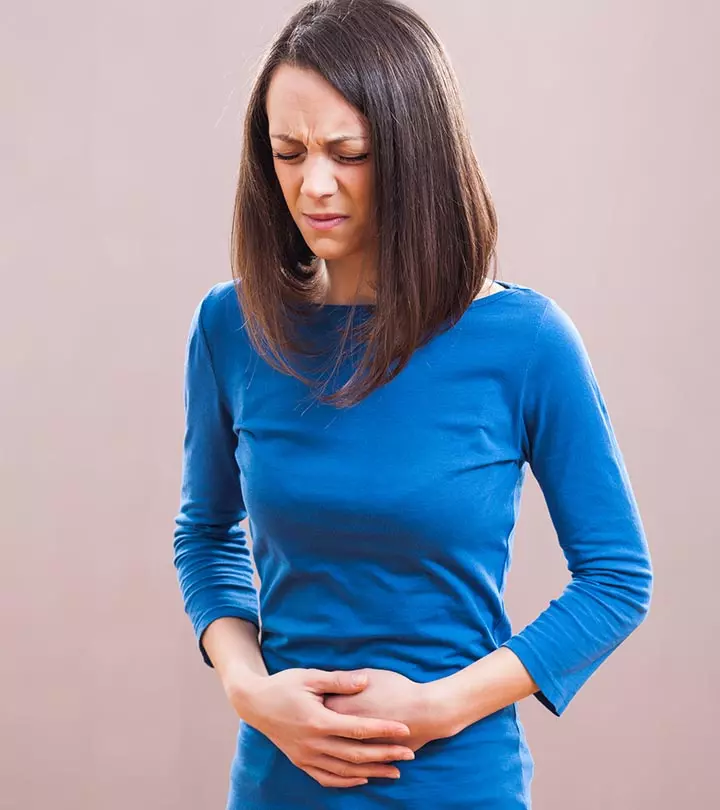
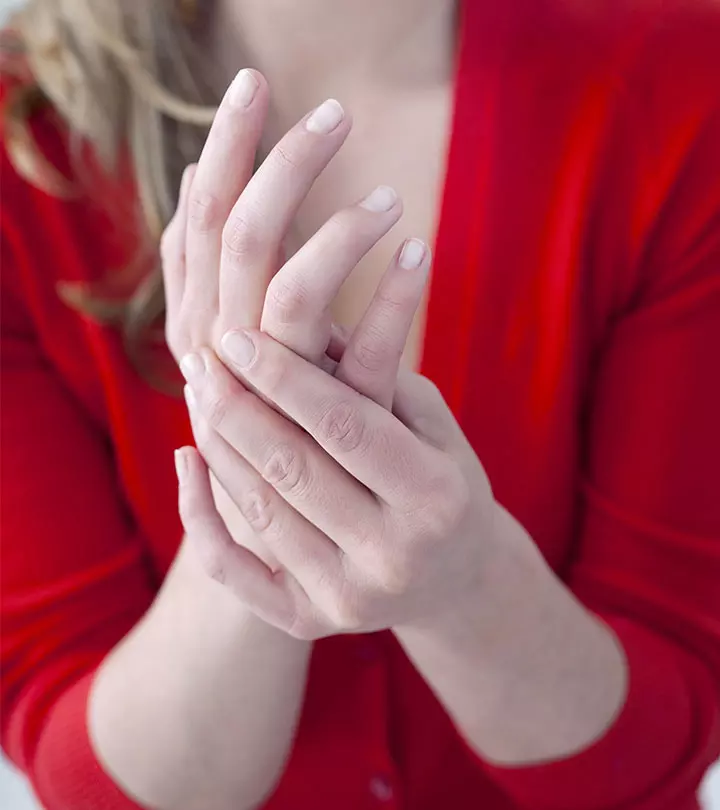
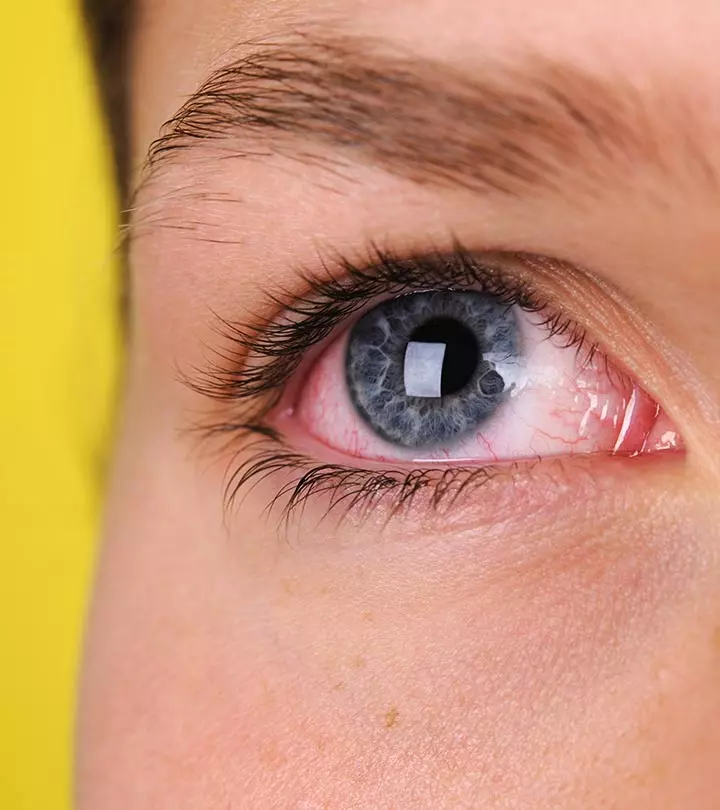


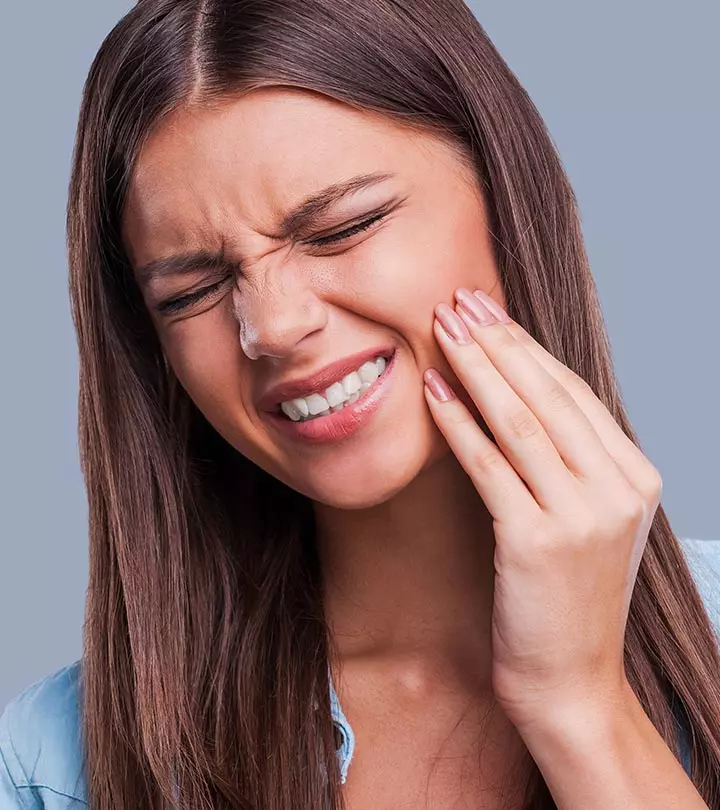
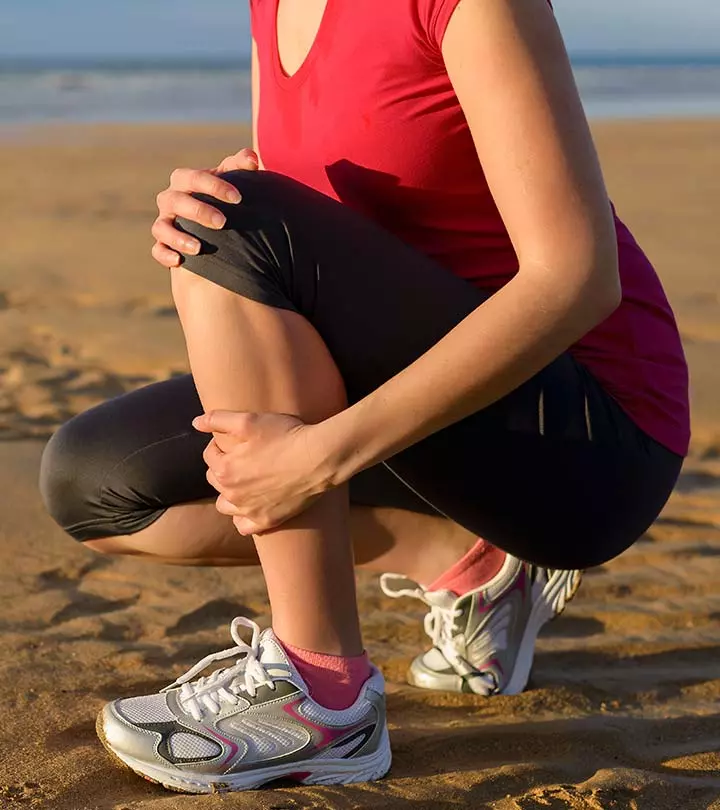
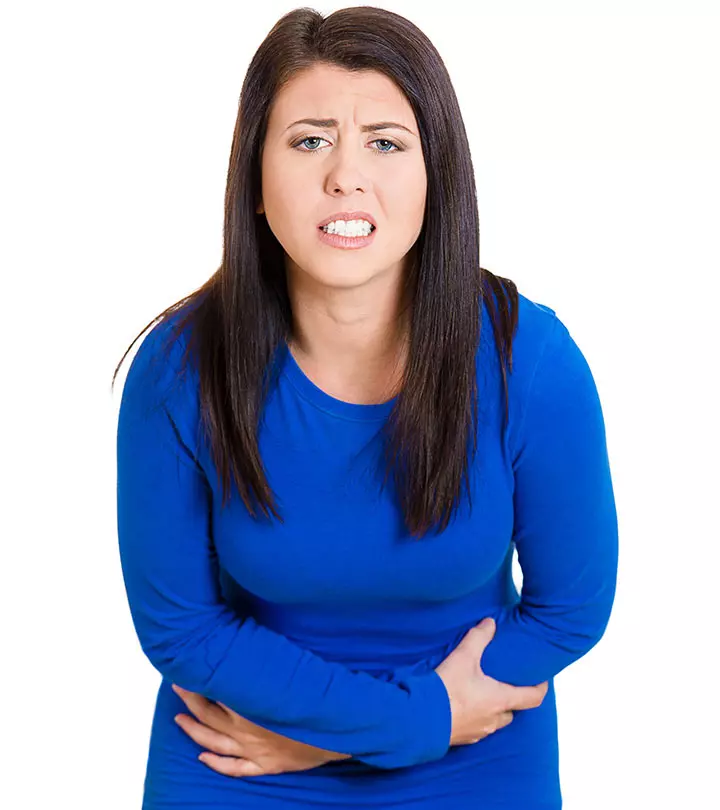

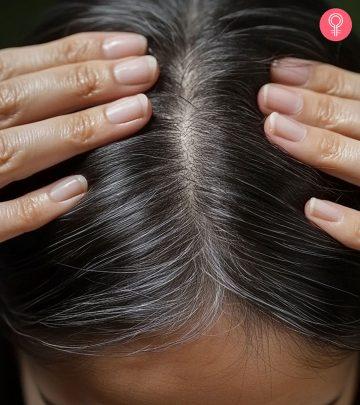



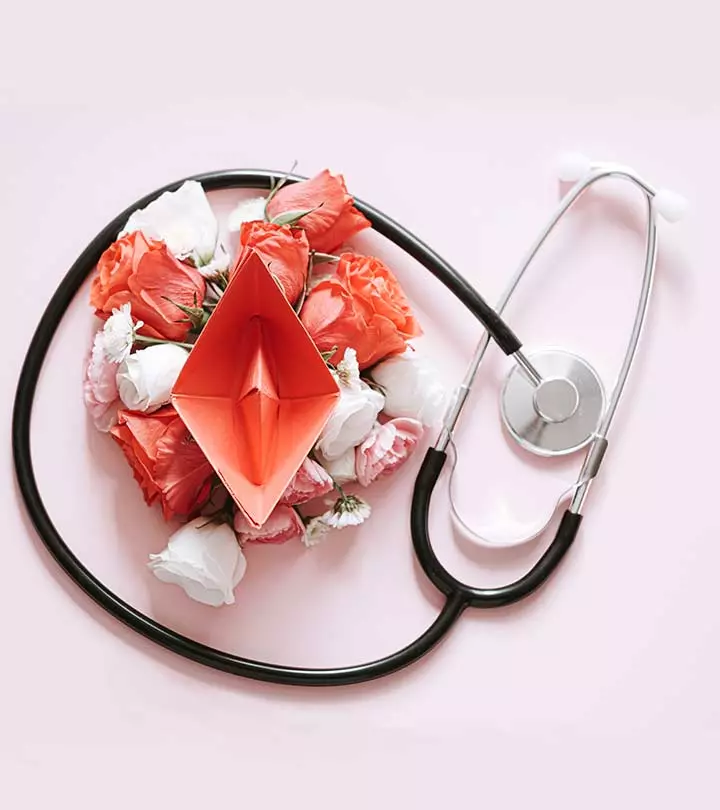
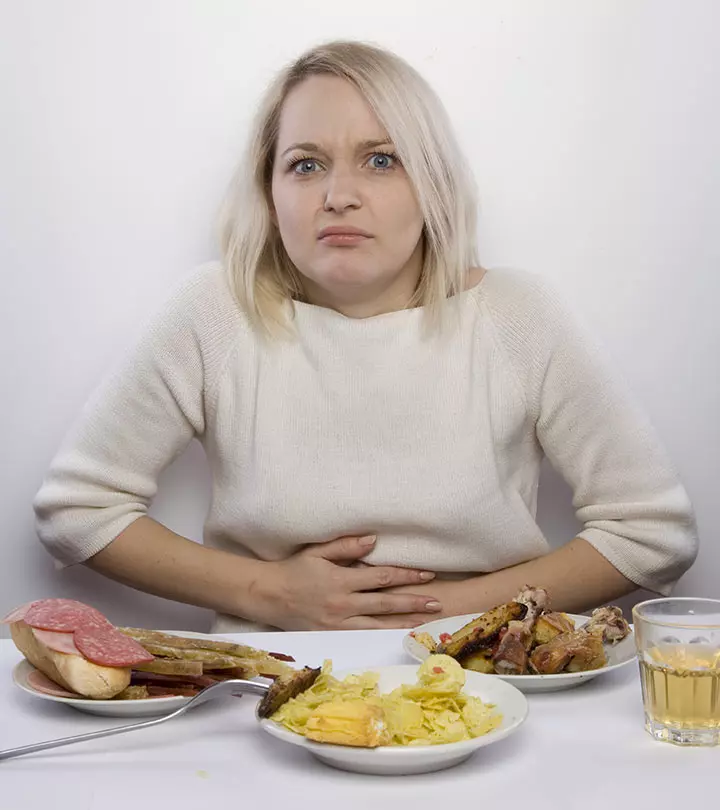
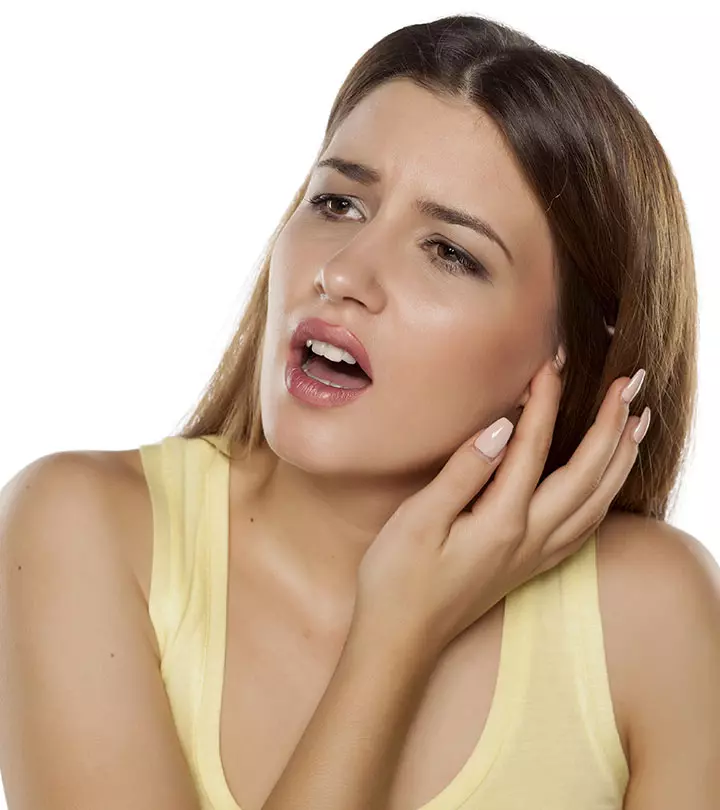


Community Experiences
Join the conversation and become a part of our empowering community! Share your stories, experiences, and insights to connect with other beauty, lifestyle, and health enthusiasts.